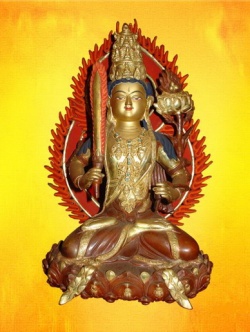Difference between revisions of "First four flavors"
| Line 2: | Line 2: | ||
[[first four flavors]] | [[first four flavors]] | ||
| − | [ | + | [[[前四味]]・[[四味]]] (Jpn [[zen-shimi]] or [[shimi]] ) |
| − | Also, four flavors, four tastes, four inferior flavors, or four preceding flavors. The first four of the five flavors—those of fresh milk, cream, curdled milk, butter, and ghee (the finest clarified butter). [[T'ient'ai]] (538-597) used the five flavors as a metaphor for the [[Buddhist teachings]] of the five periods— the [[Flower Garland]], [[Agama]], Correct and Equal, [[Wisdom]], and [[Lotus]] and [[Nirvana]] periods. He compared the process by which [[Shakyamuni Buddha]] instructed his [[disciples]] and gradually developed their capacity for [[enlightenment]] to the process whereby milk is converted into ghee. The four flavors indicate all the [[sutras]] expounded before the [[Lotus]] and [[Nirvana]] period, in other words, the pre-[[Lotus Sutra]] teachings. The ghee represents the teachings of the [[Lotus]] and the [[Nirvana]] [[sutras]]. The expression "the four flavors and three teachings" can also indicate the entire [[body]] of teachings preached before the [[Lotus Sutra]]. The three teachings are the first three of the four teachings of doctrine—the [[Tripitaka]] teaching, the connecting teaching, the specific teaching, and the perfect teaching. | + | Also, four flavors, four tastes, four inferior flavors, or four preceding flavors. The first four of the five flavors—those of fresh milk, cream, curdled milk, butter, and ghee (the finest clarified butter). [[T'ient'ai]] (538-597) used the [[five flavors]] as a metaphor for the [[Buddhist teachings]] of the five periods— the [[Flower Garland]], [[Agama]], Correct and Equal, [[Wisdom]], and [[Lotus]] and [[Nirvana]] periods. He compared the process by which [[Shakyamuni Buddha]] instructed his [[disciples]] and gradually developed their capacity for [[enlightenment]] to the process whereby milk is converted into ghee. The four flavors indicate all the [[sutras]] expounded before the [[Lotus]] and [[Nirvana]] period, in other words, the pre-[[Lotus Sutra]] teachings. The ghee represents the teachings of the [[Lotus]] and the [[Nirvana]] [[sutras]]. The expression "the four flavors and three teachings" can also indicate the entire [[body]] of teachings preached before the [[Lotus Sutra]]. The three teachings are the first three of the four teachings of doctrine—the [[Tripitaka]] [[teaching]], the connecting [[teaching]], the specific [[teaching]], and the perfect [[teaching]]. |
{{R}} | {{R}} | ||
Revision as of 17:12, 25 August 2013
[[[前四味]]・四味] (Jpn zen-shimi or shimi )
Also, four flavors, four tastes, four inferior flavors, or four preceding flavors. The first four of the five flavors—those of fresh milk, cream, curdled milk, butter, and ghee (the finest clarified butter). T'ient'ai (538-597) used the five flavors as a metaphor for the Buddhist teachings of the five periods— the Flower Garland, Agama, Correct and Equal, Wisdom, and Lotus and Nirvana periods. He compared the process by which Shakyamuni Buddha instructed his disciples and gradually developed their capacity for enlightenment to the process whereby milk is converted into ghee. The four flavors indicate all the sutras expounded before the Lotus and Nirvana period, in other words, the pre-Lotus Sutra teachings. The ghee represents the teachings of the Lotus and the Nirvana sutras. The expression "the four flavors and three teachings" can also indicate the entire body of teachings preached before the Lotus Sutra. The three teachings are the first three of the four teachings of doctrine—the Tripitaka teaching, the connecting teaching, the specific teaching, and the perfect teaching.
